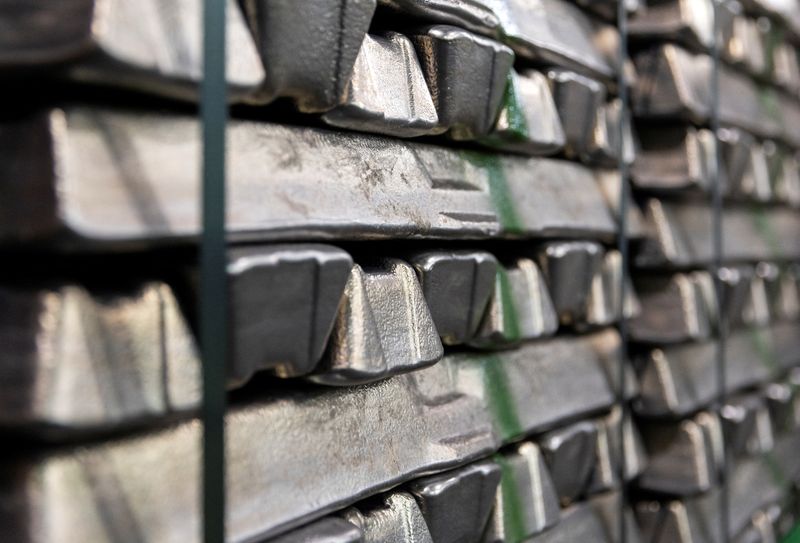By Pratima Desai
LONDON (Reuters) - European and U.S. buyers will compete aggressively for Middle Eastern aluminium if the European Union bans Russian metal in coming months, sparking price rises reminiscent of 2018 when sanctions were imposed on Rusal.
A race for aluminium from Middle Eastern countries, including the United Arab Emirates and Bahrain, will fuel inflation for Western companies in the transport, packaging and construction industries - already facing high raw material and payroll costs.
Aluminium is a key ingredient for electric vehicles. Significantly lighter than steel, it is now the metal of choice in a wide range of parts for electric vehicles.
The EU has for months discussed sanctions that would ban Russian aluminium. No new sanctions on aluminium were included in its latest package to mark the second anniversary of Russia's invasion of Ukraine, but the bloc is expected to soon propose another package with new import bans, sources said.
Middle Eastern producers were responsible for 6.2 million metric tons or nearly 9% of global supplies last year, according to the International Aluminium Institute. Roughly two million of that was shipped to Europe and the United States.
The loss of Russian metal would leave Europe with a shortfall of around 500,000 tons, some of which could be offset with the restart of idled capacity in the region. But not all.
"Middle Eastern suppliers will not be able to fully substitute Europe's shortfall quickly," said Dmitri Ceres at U.S.-based aluminium trader PerenniAL.
Buyers of aluminium in the physical market pay the London Metal Exchange (LME) price plus a premium to cover transport and handling costs and taxes.
"European premiums will have to rise to attract metal away from other regions including the United States. Premiums in the U.S. will also have to rise to keep the metal coming," Ceres said.
U.S. sanctions on Russian producer Rusal in April 2018 triggered a crisis that saw aluminium on the London Metal Exchange (LME) jump 35% in a few days to seven-year highs.
European duty-paid premiums shot up 45% in the following month, while U.S. premiums increased 20% over the same period.
EYES ON LME RESPONSE
Price rises in the event of a new ban are unlikely to extend as far as those in 2018 due to surpluses in Asia, with Russian supply also likely to be diverted to China, already a major recipient of Russian aluminium after Russia invaded Ukraine.
However, the strength of the reaction will depend on whether the LME as a result of EU sanctions decides to ban Russian origin aluminium, which comprises 90% of inventories in LME registered warehouses.
"If Rusal's tonnages were no longer accepted in transactions on the LME, given the lack of non-Russian metal in warehouses, physical premiums and LME prices would in all likelihood spike up violently," said Bank of America (NYSE:BAC) analyst Michael Widmer.
Self-sanctioning and 200% tariffs on U.S. imports have meant many U.S. companies have diversified away from Russia to other countries, including the Middle East.
U.S. imports of Russian aluminium dropped to 16,902 tons last year or 0.4% of the total, from 4% in 2022 and nearly 9% in 2018, figures from Trade Data Monitor (TDM) showed.
However, even though EU imports of Russian aluminium have dropped, they are still significant. According to TDM, EU imports of Russian aluminium totalled 512,122 tons in 2023 or 8% of the total from 12% in 2022 and 19% in 2018.
"EU sanctions on Russian aluminium will mean higher premiums in Europe. U.S. premiums will then have to go up as well to stay competitive," said BNP Paribas (EPA:BNPP) analyst David Wilson.
"European premiums are already higher, shipping costs of getting the metal from the Middle East and other Asian countries have risen because of the attacks in the Red Sea."

Freight costs have climbed due to Houthi militant attacks on vessels in the Red Sea, targeting a route that allows East-West trade to use the Suez Canal.
EU imports of aluminium from the Middle East were nearly 1.2 million tons or 18.8% of the total last year, while the U.S. imported more than 800,000 tons or 19.3%.